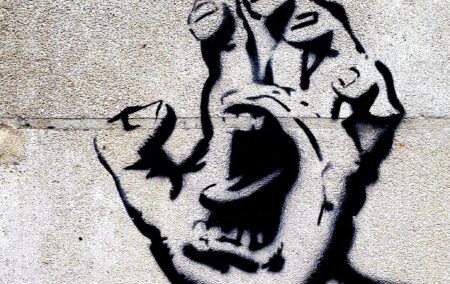When the global rage over the death in the United States of George Floyd subsides, as it will when life goes back to ‘normal’, it is doubtful there will be any protests or mobbing of colonial statuary over what ‘normal’ is, and why.
The ordinariness of everyday normality makes it tolerably familiar, as if it’s fated, a consequence of ‘how things are’, and has nothing do with anyone’s choices. It’s not new. It’s never ‘news’. Not, at least, in the way that ‘George Floyd’ is – less the man himself than what his fate is taken to represent.
Few, except the indifferent, will have watched that awful, almost desperately undramatic, video of immobilised George Floyd’s last moments, pleading for breath, and not imagined the impotence and panic, and then – knowing that no relief came, that that was it, he died – not have felt the desire to rage against injustice.
If the essential virtue of this sentiment has been reflected in the peaceful protests around the world of many thousands of good people who felt strongly enough to publicly register their objections, and their values, the same has not been universally true of the viral anger and the violence, the certainty of the blaming.
Which is not to say nothing good ever comes of tragic events that trigger moral outrage, blind as it often becomes.
The Economist began a piece on Floyd this week with an account of the arrest on 4 May of a 30-year-old Mexican bricklayer, Giovanni López, in Ixtlahuacán de los Membrillos, a town near Guadalajara.
Did not go viral
‘Why they detained him is unclear. The next morning his family found him dead in a nearby hospital, with bruises on his head and a bullet in his ankle. His name did not go viral; no politician lamented his death.
‘Christian López, who filmed his brother’s arrest, stayed silent at first. He would later claim that messengers acting on behalf of the local mayor threatened to kill his family if the footage went public. But then came the killing of George Floyd in Minneapolis, and the anti-police, anti-racism backlash that has swept the world. “I saw it and thought, this is the same thing that happened to my brother,” he says. On June 1st he went to the press.’
There were swift results.
‘The chief prosecutor in the state of Jalisco, where the death occurred, faced a barrage of questions. On June 4th a march in Guadalajara, marking a month since Giovanni’s death, turned violent. Calls demanding #Justiciaparagiovanni increased. The three officers connected with Giovanni’s death were arrested. The mayor’s role is under investigation. Protests have since spread to Tijuana and the state of Veracruz against two local pre-Floyd police killings, of Oliver López (no relation) in March and Carlos Andrés Navarro in May.’
Why Floyd’s death provoked global protests while countless other unjust killings did not, the magazine said, ‘is hard to say’.
‘Mr Floyd was American, of course, and the world pays more attention to the United States than to Mexico or any other country.’
Moral puzzle
There is some sense in this, but a moral puzzle, too.
Of South Africa, for example, The Economist piece noted pointedly that ‘(since) 2012 there have been more than 40 000 complaints against the South African Police Service for alleged crimes including rape and murder, with just 531 convictions. Security forces have killed at least 11 people during South Africa’s lockdown, in place since March 27th, and more than 200 000 have been arrested. Mr Ramaphosa has said merely that authorities have been guilty of “over-enthusiasm”.’
It added: ‘That will not wash with many South Africans.’
You would have thought this would be truer than it actually is – especially in the wake of George Floyd’s death. It certainly wasn’t true in the wake of Collins Khosa’s death on 10 April, or even the deeply unsettling procedures since.
Instead, South Africa has witnessed what is more akin to spectacle.
Unstatesmanly
It is the spectacle of President Ramaphosa declaring that ‘(even) after 26 years the economy is still in the hands of the few, predominantly white people, while the poor and unemployed are overwhelmingly black’ without wondering to himself how unstatesmanly it is to absolve his government of its chronic economic failure and snatch at race to blame the hard-working, tax-paying middle class that is the only thing standing between him and a failed state.
It is the spectacle of some of the country’s most cossetted and privileged school pupils expressing their anguish with all the elevated status they derive from attending institutions for sums the bulk of South Africans could only dream of earning in a lifetime.
Their wealth and privilege does not negate their moral sensibilities, but, like the president’s, their choices might.
And the choices that matter have little to do with race, or with the conduct or oversight of the police. Rather, they have everything to do with ‘normal’ life.
As The Economist observed drily: ‘Police brutality in developing countries rarely prompts a global reaction. But then neither does poverty or needless economic hardship or government failure in developing countries prompt a global reaction.’
Toleration of injustice
What the South African reaction to George Floyd’s death signals more clearly than anything is just how deep-seated is the toleration of the injustice inflicted on millions of ordinary South Africans by policies that undermine their choices, limit their ambitions, curb their agency and deny them the stake in the economy that would affirm their belonging and guarantee them a path out of poverty.
When the rage subsides, as it will, this will remain South Africa’s largely unprotested ‘normal’. That is not a good reason to avoid choosing to change it.
[Picture: Heather M. Edwards]
If you like what you have just read, subscribe to the Daily Friend

